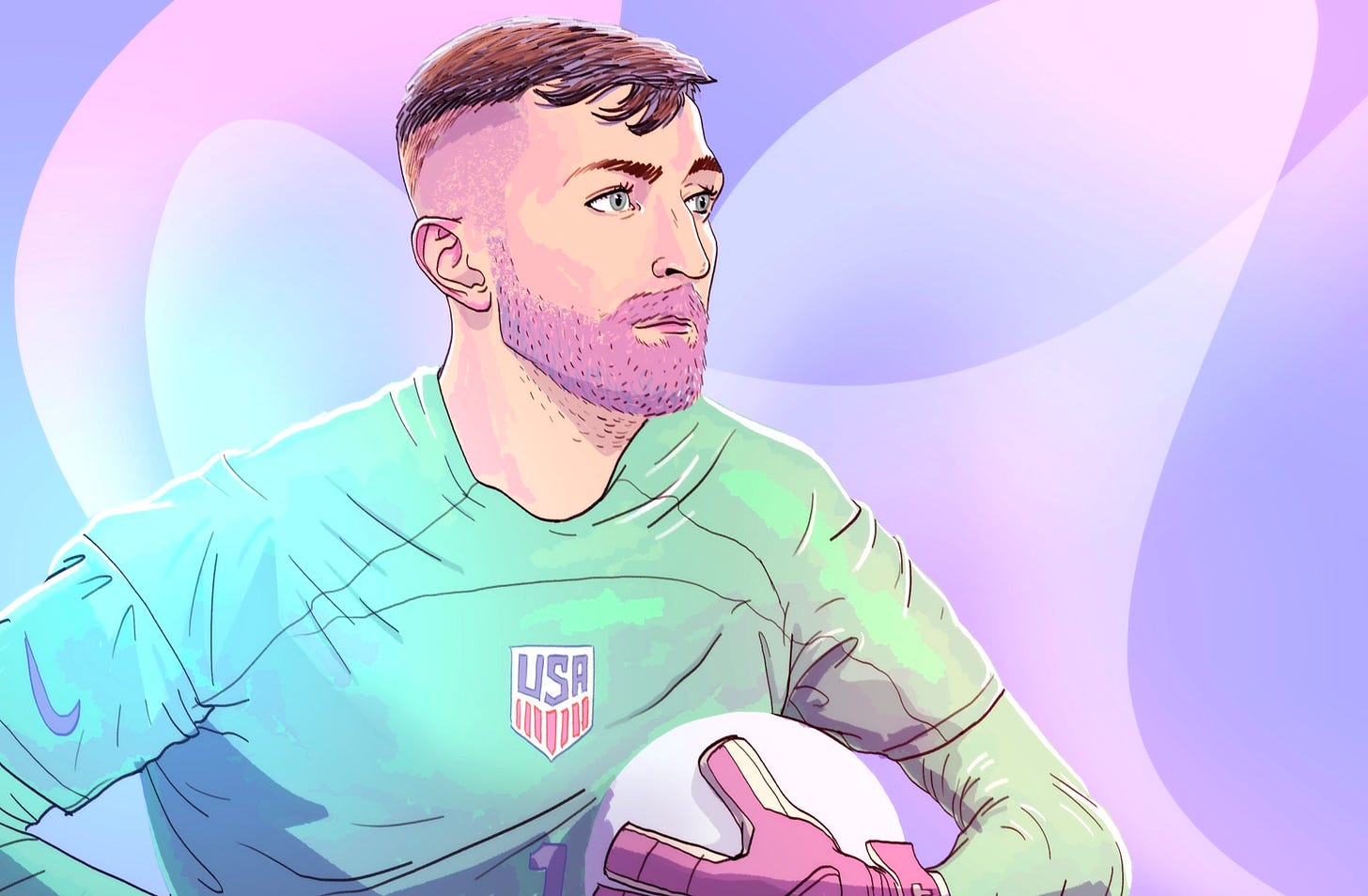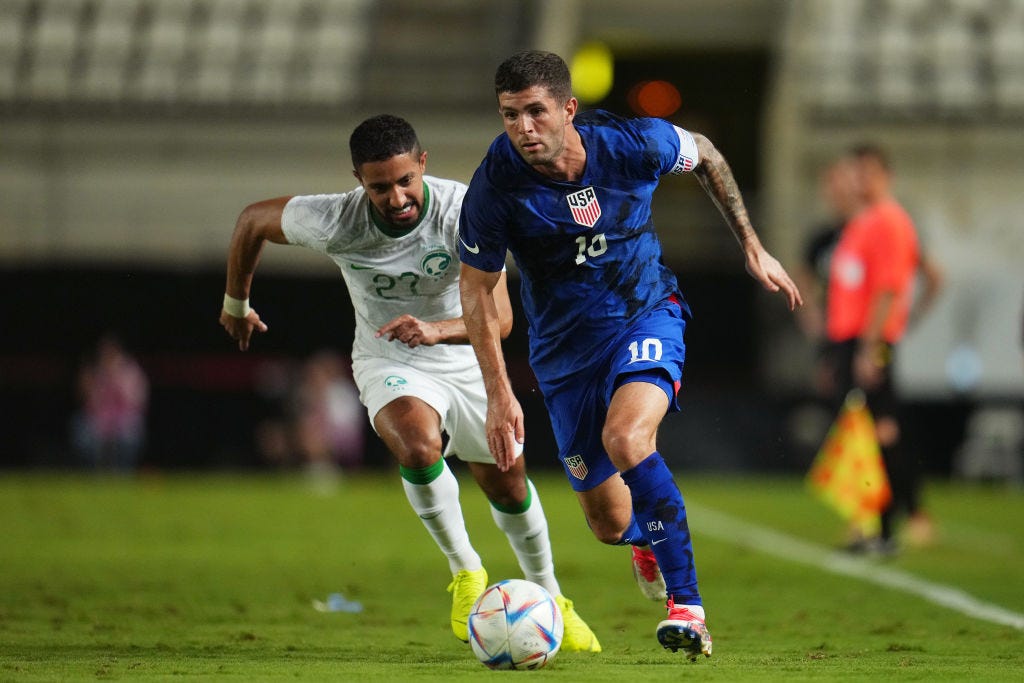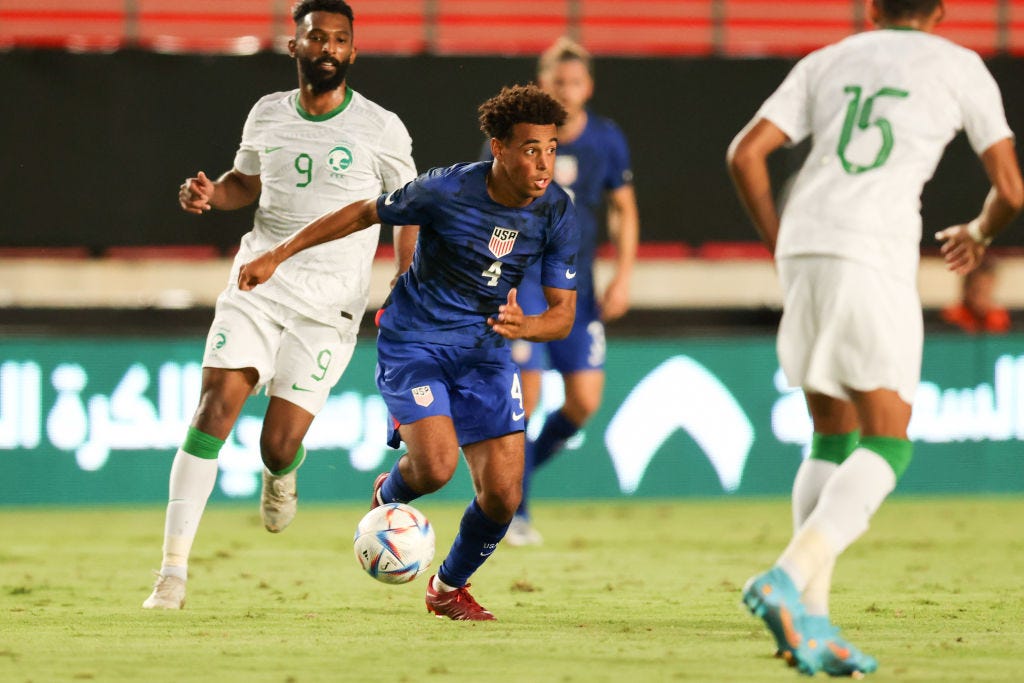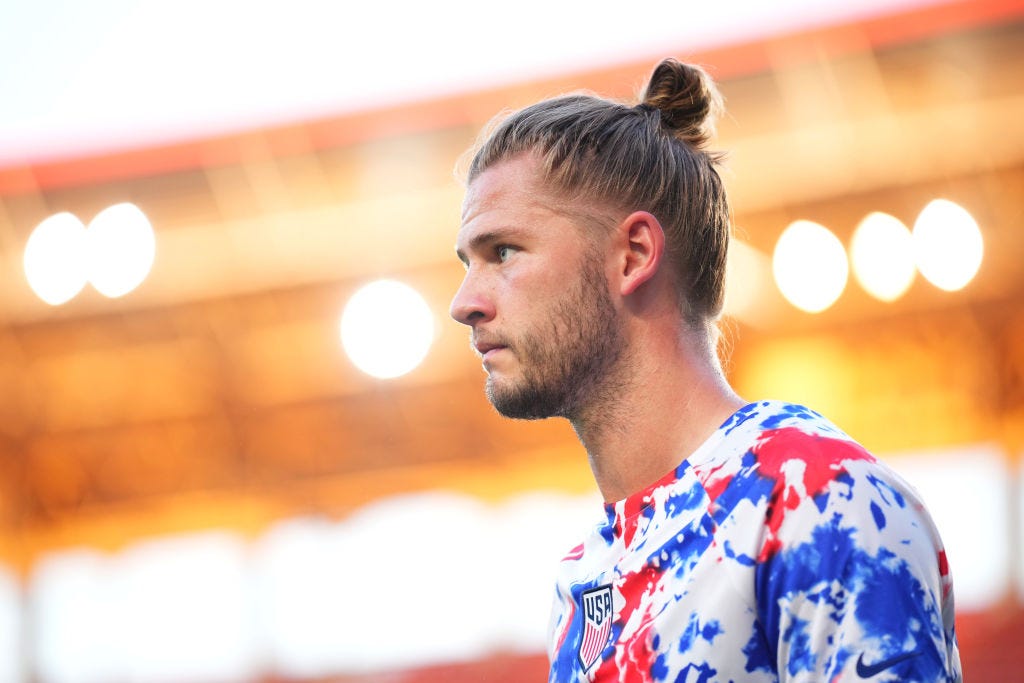Premium: Can the U.S. Get Its Mojo Back for the World Cup?
In two dreary games, the USMNT went from being expected to advance out of its World Cup group to a genuine doubt. What’s wrong? And how will the team’s most important players respond?

MURCIA, Spain — Christian Pulisic, the biggest star of the U.S. men’s national team, doesn’t talk much to the media these days ahead of the most important tournament of his career.
He turned down all requests for one-on-one interviews during this USMNT camp, and his announced appearance at a small journalists roundtable in Germany was canceled at the last moment—presumably after he decided he didn’t want to face questions about an excerpt from his soon-to-be-released book in which he criticized his former Chelsea coach Thomas Tuchel for reconsidering his decision to start Pulisic in a semifinal leg of a Champions League that Chelsea eventually won.
When I visited England in late July, one of the UK’s most respected sportswriters told me Chelsea fans desperately wanted to read an in-depth story and hear from Pulisic saying he was committed to the club and cared about it and explaining why he felt that way. My friend thought I might be able to secure that interview. I told him it was unlikely, and I was right. What Chelsea fans heard instead in August were reports that Pulisic wanted to leave the club on loan and was unhappy when Chelsea’s new ownership didn’t allow that to happen. It’s not exaggerating to say that Pulisic’s relationship with Chelsea fans is at an all-time low.
GrantWahl.com is a reader-supported soccer newsletter, and this is how I make my living. Quality journalism requires resources. The best way to support me and my work is by taking out a paid subscription now.
Pulisic’s desire for more playing time at the club level ahead of the World Cup is hardly unreasonable, and no athlete is obligated to speak to the media. My British writer friend simply thought it was in Pulisic’s best interest to communicate in detail publicly in a way that he hasn’t for a while now. Pulisic may well be heard from in the deluge of media coverage that comes right before the World Cup kicks off on November 20. He also has a record of meeting behind-the-scenes with children and special-needs fans that’s admirable. His teammates like him. Those things count.
But the contrast these days between Pulisic’s near silence and the day-to-day volubility of teammates like Tyler Adams, Walker Zimmerman and Matt Turner is striking. Soccer still isn’t fully established in the United States, and the sport in the U.S. could benefit in a material way from its biggest star using the platform that is being offered on a mega basis only once every four years.

I once did a story using Google Trends data on Pulisic’s biggest career moments; searches in the U.S. for his name were significantly higher when Pulisic did minor things for the national team than they were for some of his most important achievements in European club soccer. In the U.S., how you perform for the national team still matters the most for your public profile.
Pulisic’s reticence is a missed opportunity, both for soccer in the U.S. and for him, including when it comes to endorsements (which do appear important to Brand Pulisic). But at this point it’s clear that other U.S. players are in the position to become the team’s breakout media figures of the World Cup.
I thought about all of that here on Tuesday night in a near-empty stadium watching the U.S. labor again in a grim 0-0 tie against Saudi Arabia in the last game before the World Cup. In two games over the past week, the U.S. has gone from a team that was cautiously expected to advance from its World Cup group to one that is a genuine doubt to do so. Meanwhile, Pulisic isn’t playing much at Chelsea and may not be a guaranteed starter in Qatar (which, by the way, he wasn’t always during World Cup qualifying).
Is Pulisic’s pre-World Cup funk off the field connected to what’s happening on the field for him in recent months? It has to be, to some extent. These two U.S. games offered the chance for him to have some signature moments again, to kickstart his comeback.
But Pulisic missed the bewildering 2-0 loss to Japan with a knock, and while he showed some flashes on the ball against the Saudis, mostly in the first half, he and his U.S. teammates had another disappointing attacking game and managed just two shots on goal. When U.S. coach Gregg Berhalter removed Pulisic in the 75th minute, Pulisic didn’t seem thrilled. He tossed his captain's armband to Adams and sprinted off the field, acknowledging his teammates entering the game but blanking Berhalter on his way to the bench.
Blanking has been a common theme lately for this U.S. team, which has failed to score in three of its last four games against teams going to Qatar. “Better to have these types of performances right now than to have them at the World Cup,” said midfielder Weston McKennie, another team leader whose energy, sometimes high and sometimes low, is a bellwether for the U.S. team. “Obviously we know that we can do better, and we know that we’re going to have to do better if we want to succeed in the World Cup. So I think this window as a whole is a big learning lesson, and the last little jitters are out, and hopefully when we get to the World Cup it’ll be like how it used to be.”
The way McKennie said “how it used to be”—in an almost wistful tone—makes this moment feel like the low point in one of those old VH1 Behind the Music episodes. But that comparison would be presupposing a bounceback at the World Cup. That’s not guaranteed, and the spotlight will be exponentially brighter in Qatar than it was in these two games.
“Go to your club, perform well, get in form. It’s all you can focus on,” said Adams, talking about where the U.S. can go from here. “In six weeks we have to get on the plane to Qatar with the right mindset to perform for the national team again. I think at every point before this camp, coming into camp we’ve been very confident, especially through our play. We’ve seen improvement in every phase. And it’s just the reality of a setting in any team sport that you’re going to have ups and downs. Right now we’re in a down moment, so when we get on that plane to Qatar we need to be ready to perform.”
The word Berhalter used most often after the game was confidence, which is a worrying sign this close to the World Cup.
“We were just off on a number of plays,” Berhalter said, “and I think it has to do with the confidence of the group … Confidence is a tricky thing, and I know when the guys are playing confident we’re a very dangerous team, a very dynamic team. And you saw some of them thinking almost on the field today. We want to take that out of them. We want them to just play and play with that aggression and intensity and speed that we know that they can.”
For the first time in the camp, even Pulisic spoke to the media. And when you’re the team’s biggest star and communicate rarely, people are going to pay attention to what you say.
As you might expect, Pulisic said it was good to be back on the field, and he added there was no ill intent in the way he departed the game, but rather just a desire to see the team score a goal.
Pulisic did express some frustration, though, over the way the U.S. attack, which had found some space down the left side in the first half, petered out in the second half.

“I think we made a couple adjustments in the second half that maybe weren’t particularly needed,” he said. “We kind of weren’t testing them as much in behind. I thought we had some good runs, some good plays in the first half and there was some good flow, especially down the left side. I didn’t feel that as much in the second half for whatever reason. But I think that’s credit to [Saudi Arabia] as well.”
“There’s a lot of different ways to score goals,” Pulisic continued later. “There are times when we can put more crosses in the box, we can be more aggressive, more relentless going forward, and just test them even more so.”
Now the question for Pulisic becomes his playing time at Chelsea, which has 13 games in rapid succession before the World Cup break. There should be occasions for Pulisic to start under new Chelsea coach Graham Potter, and there should be the chance to earn significant playing time that would obviously benefit the U.S. in Qatar.
“I’m feeling good going back, honestly,” Pulisic said. “I have a fresh start now, and I’m excited to play for the new manager. I’m really just looking forward to it, and I know I just have to prove myself, as everyone does and as I’ve done before.”
This isn’t your typical World Cup preparation, when national teams have up to three weeks to get ready after the end of the club season. Clubs will release their players just one week before the start of the tournament, which doesn’t leave any time for teams like the U.S. (which begins play on World Cup Day 2) to schedule a friendly before things kick off for real.
“It’s a bit odd because everyone goes back to their club and it’s everyone for themselves in a sense,” Pulisic said. “But that’s the message that we have to send: Do everything that you can, prepare your body physically and mentally as best you can to be prepared once that time comes. And if everyone does that, I think we’re going to be in good shape for the World Cup.”
Maybe. The tone about this U.S. team changed over the past week, and it will be up to Berhalter in the coming weeks to make some tough decisions on his final World Cup roster and come up with ways to address the issues we saw against Japan and Saudi Arabia, including the lack of scoring, the problems dealing with pressure and a shortage of confidence. Those aren’t small things.
After the game on Tuesday, Berhalter was asked about the 26-man roster he’ll have to cut down to before the November 9 announcement, with the assumption that this camp might not have cleared up some of the questions about his choices. But he pushed back on that presumption.
“I think we got some clarity,” he said. “We talked about it today with the coaching group, and I think things became pretty clear.”
Which things?
“Things,” Berhalter said with a smile, leaving it at that.
What’s up in the air for the World Cup roster? Let’s break it down.
FORWARDS
After two games without any U.S. goals, the calls will continue to grow for Jordan Pefok, the striker who was omitted from this camp and has been providing goals and assists for Union Berlin, which leads the German Bundesliga. Jesús Ferreira continues to be Berhalter’s most likely choice as the starting No. 9 for Qatar. Ricardo Pepi didn’t show much as a starter against Saudi Arabia, and Josh Sargent didn’t make a mark in his 45 minutes against Japan. Nor did it help Sargent’s chances that Berhalter chose to bring on Ferreira instead of him in the second half on Tuesday.
But honestly? I just don’t think Berhalter rates Pefok, and while I don’t get why you wouldn’t bring him to Qatar, I will not be surprised if Berhalter omits him for the tournament.
At this point, you would think the starting wingers would be Pulisic and Brenden Aaronson, but Gio Reyna (who came off Tuesday with a hamstring flareup) could be a possibility, as could Tim Weah if he rebounds from his own injury issues.
Locks: Ferreira, Pulisic, Aaronson, Reyna, Weah
Likely: Paul Arriola
In the discussion: Pefok, Pepi, Sargent, Brandon Vázquez, Haji Wright, Jordan Morris
MIDFIELDERS
Adams and McKennie figure to start, and it’s remarkable how important Yunus Musah has become with his ball-carrying abilities, which no one on this team could replicate in his absence to injury over the previous two games. Musah could be the U.S.’s breakout star at the World Cup, but having a 19-year-old as an indispensable player isn’t a great sign, either.
Locks: Adams, McKennie, Musah, Kellyn Acosta
Likely: Luca De La Torre, Malik Tillman
In the discussion: Johnny Cardoso, Cristian Roldan, Eryk Williamson, Djordje Mihailovic

DEFENDERS
Berhalter’s insistence on starting Aaron Long next to Zimmerman in the central defense remains perplexing, not least because Long struggled in these two games with his passing and dealing with pressure. If Chris Richards can get healthy and secure playing time with Crystal Palace, you would think his ball-playing ability would make him a candidate to start next to Zimmerman.
Sergiño Dest will be the starting right back even if he doesn’t get much playing time with AC Milan, and Jedi Robinson will be a welcome return to left back assuming he’s healthy.
Locks: Dest, Zimmerman, Long, Richards, Jedi Robinson
Likely: Reggie Cannon, DeAndre Yedlin
In the discussion: Joe Scally, Cameron Carter-Vickers, Tim Ream, James Sands, Mark McKenzie, Erik Palmer-Brown, Sam Vines, Miles Robinson
GOALKEEPERS
Matt Turner was the best U.S. player over the two games in this camp. When I asked him on Tuesday if he thought he had made his case to be on the field in Qatar, he said: “Yeah, for sure. It’s always nice when you play games and get a clean sheet. So I definitely feel like I’ve made my case.”
During the press conference, I asked Berhalter about his decision to start Turner in both games this week ahead of Ethan Horvath and Sean Johnson.
“It was a difficult decision, and first and foremost I feel for Sean and Ethan for not getting any game time in this camp,” Berhalter said. “It’s never an easy decision. We had to really think about what’s going to happen these next six weeks. We knew that Ethan would be playing for his club, we knew Sean would be playing for his club, we couldn’t guarantee that Matt would be playing for his club. So we wanted to give him these games that are really important.”
Even though Zack Steffen has missed games due to injury and hasn’t played very well even when healthy over the past year, I can’t escape thinking that Berhalter would still lean toward Steffen in Qatar if he’s fit and ready to go.
In my one-on-one interview with Turner this week, I asked him if he thinks he’ll get enough games at Arsenal to be sharp for the World Cup.
“Yeah, for sure,” he replied. “Between now and the World Cup starting, there’s 13 games for Arsenal. Six of them are in alternate competitions: five Europa League and one cup game. So that’s six really good opportunities for me to get on the field, not including the seven Premier League games, where obviously Aaron [Ramsdale]’s playing really, really well right now in the Prem. We’re top of the table, so obviously you can’t expect much to change in that sense when it comes to that. But I’m ready for the opportunities that present themselves.”
“Plus, I’ll be training and working hard every day,” Turner continued. “That’s just who I am, and I know that there’s areas in my game I need to always continue to improve upon, and being at Arsenal is helping me to improve upon those things. And if I was in MLS right now, I would end the season in the beginning of October, and then I would have a month off before the World Cup. So there’s arguments to be had on both sides, where at least I’ll be training and playing some games, and I’ll probably play more games than most between now and then.”
Locks: Turner, Steffen
Likely:
In the discussion: Horvath, Johnson, Gaga Slonina
This has been a sobering week for the USMNT in Europe. And yet players like Zimmerman weren’t ready to say there’s a collective concern on their part now with the World Cup looming so soon.
“I don’t think so,” he said. “Qualifying is such a good lesson for us. We’re used to having games where we don’t feel like we performed our best and everyone says maybe the sky is falling a little bit and there are reasons to be concerned. Internally we’re a confident group. We trust each other. We believe in each other. And we know at the end of the day we’re the ones that are going to be on the field. We’re the ones who are going to have to get results. And I think no matter what, we’re going to stick together and be confident in what we have.”
U.S. fans can be forgiven for being less confident now, however. This U.S. team needs to figure things out, and fast.




Grant, Grant, Grant.
Behind the Music was on VH1, not MTV.
Hopefully access to players goes up in November. It’s important for the growth of the game.
But what’s most important for growth of the game in the US is success on the field.